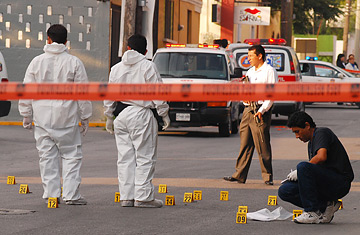
Forensics investigators work at the scene where heavily armed assailants opened fire on the police headquarters of a wealthy suburb of Monterrey, May, 2007.
Mexico's drug war had produced relentless bad news for years — until this week. The headlines south of the border have been awash in a ghastly wave of bloodshed — mass executions, videotaped beheadings, rocket-grenade assaults on police stations and newspaper offices — that has all but spun out of the government's control and saddled Mexico with one of the hemisphere's worst crises of civil violence. There have been 1,300 drug-related murders recorded in Mexico already this year, compared to some 2,000 for all of last year. And so, there was cautious optimism over reports that at least a temporary cease-fire might be in the offing.
U.S. and Mexican officials confirm that Mexico's major rival drug-trafficking organizations, the Sinaloa and Gulf cartels, "may be trying to negotiate a truce" and come to some agreement over control of territory, says a knowledgeable U.S. official. The two mafias could be coming to the table for two key reasons. First, "the violence has drawn too much attention and has really begun to hurt [their drug-trafficking] business," says Steven Robertson, a special agent for the Drug Enforcement Administration (DEA). And second, Mexican President Felipe Calderon's popular but oft-questioned strategy of throwing the military at the cartels — some 25,000 soldiers have been deployed to violence-ravaged states like Michoacan this year — "is starting to pay dividends," insists a high-ranking Mexican official.
But both countries, rightly, remain as skeptical as they are optimistic. That's because Mexico's narco-terror isn't just about the Sinaloa-Gulf feud. It's also a struggle between opposing mind-sets in each cartel: the more pragmatic businessmen, who are worried that all the blood has begun to hamper the efficiency of their cocaine distribution "plazas" in Mexico and along the U.S. border; and the more violent enforcers, who tend to see trafficking competition as a zero-sum game. The latter have enjoyed the upper hand ever since Mexico's traditional cartel structures began to disintegrate about five years ago and gangs like the Zetas — former army special forces soldiers who today are the Gulf cartel's dominant faction — filled the vacuum. As a result, the success or failure of any cartel negotiation is likely to rest on which priority prevails — commerce or conquest.
And even if the cartels do come to an agreement that might reduce the violence, it won't reduce the trafficking. That's because the U.S. still has not done enough to reduce its voracious demand for cocaine, marijuana and methamphetamines, and because Mexico has yet to really confront one of the main causes of the country's narco-chaos: underpaid and under-trained cops who are easily bought by the cartels and, in many states and cities, have simply become part of the cartel fabric (and as a result are often the victims of cartel assassinations). Calderon's military campaign may have boosted him in the polls, but soldiers are hardly a reliable long-term solution against drug trafficking. "We have to focus on police institution-building," concedes the Mexican official. Mexico's Secretary of Public Security, Genaro Garcia Luna, took a step toward that end earlier this week when he replaced all 284 of his federal police commanders with more professionally trained chiefs.
In the meantime, Mexicans hope the cease-fire reports hold true — as does Washington, which stands to see border headaches like illegal immigration worsen if the violence continues to spiral. One Mexico City daily reported over the weekend that the nation's gangland murders last week dropped to 44 from the year's weekly average of 60. In any other country, 44 narco-murders in a week might seem terrifying. In 21st-century Mexico it's considered a respite.
